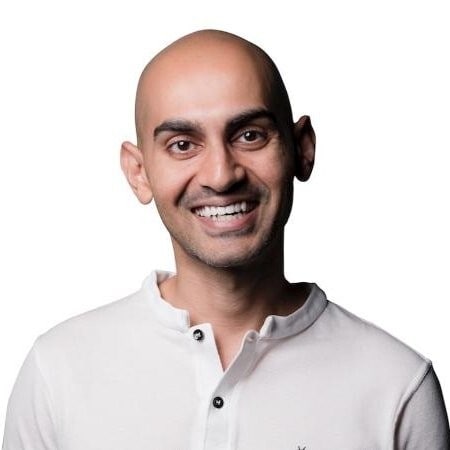Scaling Innovation Through Speed
An Interview with Neil Patel, Co-Founder of NP Digital
 Neil Patel has built his reputation on staying ahead of digital marketing's relentless pace of change. Named a Top 100 Entrepreneur Under 30 by President Obama and recognized as a top 10 marketer by Forbes, Patel co-founded NP Digital into a global agency serving clients across 20+ countries with over 1,000 employees. His approach to innovation isn't about revolutionary breakthroughs—it's about solving emerging problems faster than anyone else. In an industry where yesterday's winning strategy can become tomorrow's liability overnight, Patel's philosophy centers on speed, adaptability, and the surprisingly underutilized practice of simply talking to customers.
Neil Patel has built his reputation on staying ahead of digital marketing's relentless pace of change. Named a Top 100 Entrepreneur Under 30 by President Obama and recognized as a top 10 marketer by Forbes, Patel co-founded NP Digital into a global agency serving clients across 20+ countries with over 1,000 employees. His approach to innovation isn't about revolutionary breakthroughs—it's about solving emerging problems faster than anyone else. In an industry where yesterday's winning strategy can become tomorrow's liability overnight, Patel's philosophy centers on speed, adaptability, and the surprisingly underutilized practice of simply talking to customers.1. Throughout your career you've pioneered numerous digital marketing strategies that became industry standards. How do you personally define innovation, and has that definition evolved?
The way I look at innovation is: How are you helping people solve new problems that they're facing in a new way? A great example of innovation is Dropbox. When it first came out, people had files everywhere. One centralized place that can store all your files and you can access it anywhere from the cloud—that's innovation. But in today's world, if you created another Dropbox copycat, that wouldn't really be innovation. That's just duplication.
My perception of innovation has changed because you can do so many more cool, crazy things that you couldn't before. Like having a robot actually in your house cleaning and doing all the chores that you would normally do. That kind of stuff would be really hard to do without the technology that we have today.
2. Your work spans content creation, SEO, analytics, and business growth. How do you and your team at NP Digital generate new ideas?
It depends on the industry, but a lot of times it starts with research. What are people talking about? What issues and problems do people have, and what are the gaps? You're looking at what issues people have and what they're talking about, and you're trying to find the gaps—the stuff that's not covered.
That usually is where we start with ideation because that's the stuff that people want, but no one's really talking about yet. If it's a problem from three years ago, chances are there's tons of content on it. If it's a problem from the last 30 days, there's a good chance there's not a ton of content on it, or the content that is out there isn't that great.
3. Many innovators have specific rituals to spark creativity and fresh thinking. Do you have any unconventional practices for resetting creative mindsets?
I don't have any unconventional tactics or even tactics. I'm a big believer that if you love what you're doing and you're passionate, you'll figure out a way to just keep pushing forward and try new things. And hopefully that helps with your creative muscle.
For finding ideas or problems, we talk to people who are potential customers or customers of competitors, and we go from there to really dig and see what problems they really face. We also mine data from Reddit and social networks. When we mine data, we look at the comments and what people are saying, and we do sentiment analysis. That gives you really cool insights on product features that you may be missing that people are talking about. But few companies take the time to actually talk to the customer—there's tons of gold there, but you just have to be able to pick up the phone.
4. You've spoken about AI's impact on search. Beyond the obvious applications, what unexpected benefits or challenges have you encountered when integrating AI into your marketing approach?
One of the biggest challenges is with accuracy of data. When you look at AI in search and them feeding up responses, we showcased an example recently on one of our webinars. When we asked about whether one of the cast members of a HBO show had passed away, the AI responses—one said yes, one said no from Google, same question asked, just different days.
That's really problematic. As Google works out the kinks, it gets much better. But if people don't trust the data that they're representing, then it's not going to be as useful to people. We need to make sure it's accurate, but Google's been doing an amazing job at improving its accuracy over time.
5. The marketing landscape changes almost weekly. What systems or resources does your team use to identify emerging trends, and how do you separate signal from noise?
We have our own tools that aren't available to the public. We crawl a lot of data, we scrape a lot of data—with people's permissions of course, or buying the data from third parties. I'm not talking about people's personal information, it's just what's out there publicly, like on search or sentiment stuff.
By analyzing this data, we can see patterns, what's missing, and opportunities. The way we really sift through the noise is we look for the stuff that has volume—that people are consistently talking about or saying that there are issues with. That's really the goal that we double down on.
6. What do you see as the biggest challenge marketers face when innovating in today's environment, and how do you recommend overcoming it?
The biggest problem in innovating in today's market is things change really fast. The way you overcome it is you just have to be able to adapt super quickly. If you can't execute fast and you can't adapt fast, you're going to end up losing.
That is a really big problem because you can do something and it could be outdated the next day, or technology can change. A great example of this is Jasper. They created a company worth over a billion dollars as an AI writer. Then ChatGPT eventually just released all their features for free, and they had to put in a new CEO.
7. Has there been an instance where a concept or approach from an entirely different industry has changed how you approach digital marketing?
Yeah, so in the software world, people tend to give away stuff in a freemium way. You get some features for free, you pay for more features, more data, more usage, more users. When I started doing digital marketing, I was like, "Ad costs are really expensive. Why not take something from the B2B SaaS world and just start giving away stuff for free?"
Not freemium, but free. For example, we help companies with their conversion optimization. Why not give them away tools or calculators that can help them with conversion optimization, like A/B testing calculators, and then sell the service? Because there's typically more money being spent on the service than the actual software. Give away some of it for free, it creates a flywheel, and then you have more leads.
8. You've built multiple successful companies. What elements do you consider essential for fostering a genuine innovation culture, particularly in marketing?
I think you have to have a culture where people want to continually learn. I think you have to have a culture where people want to own it. So if there's something that they do that's wrong, they adapt and they just admit it and they move on.
The biggest thing I always tell people is, you're going to make mistakes. Everyone does, including Elon Musk or Mark Zuckerberg or Bill Gates. The key difference between a lot of the people who are successful versus the ones who aren't is the ones who are successful learn from their mistakes, and they avoid making the same mistakes over and over again.
9. Looking ahead, how do you see the relationship between brands and consumers evolving, and how will NP Digital continue to lead marketing innovation?
I think in a world of AI, people want even more touch with brands and more interaction. In a world where we're starting to remove some of these things, we're removing friction and making things automated. You have transactions happening behind the scenes and now even people saying, "Oh, AI agents will just go do this for me and figure it out."
But I think what really separates good marketing versus great marketing is great marketing creates that special feeling, that interaction—like the feeling you get when you purchase a Louis Vuitton purse for the first time, or walking into an Apple Store.
At NP Digital, we're not just focusing on performance and driving traffic and revenue, but we're also focusing on brand. How can you have your brand top of mind? One of the ways to do it is not just through marketing, but also creating amazing experiences that people want to talk about. So we want to make sure our clients are going above and beyond for their customers and helping them do that, so that way it creates a lot more word of mouth and their brand stays top of mind versus all the competition.
References: npdigital


